SHINGAL, Nineveh Province — A Peshmerga fighter dug his dusty boot heel into the bloody, lifeless face of the jihadist who tried to kill him minutes earlier.
“Long live Peshmerga,” the young fighter yelled, raising his old Kalashnikov rifle toward the sky. In the desolate, crumbling village a few kilometers east of Shingal City, his cheers were answered by fellow fighters standing triumphantly over the bodies of dead extremists.
Back in the city, shots rang out along the frontline. Peshmerga were perched on top of the sandbag fortresses that for months had protected them from constant bombing, mortar shelling and sniper fire by the Islamic State.
But this day—Saturday, November 14—there was no return fire. After more than a year and a half in Islamic State control, the city of Shingal had been liberated.
Following weeks of delay, the offensive led by the Peshmerga, with participation from other Kurdish allies like the Kurdistan Workers’ Party (PKK) and People’s Protection Units (YPG), ended swiftly. A bombardment of US-led coalition airstrikes leading up to the operation helped wipe out most of the ISIS fighters remaining in the city.
The most valuable strategic prize of the operation was the main road running through Shingal. It served as a vital ISIS supply route from its de-facto capital of Raqqa in Syria to its stronghold of Mosul in Iraq.
The effects of retaking the city and cutting the supply line remain to be seen, but the immediate impact of liberation was very much evident.
The victory
In early August last year, ISIS besieged the city of Shingal (Sinjar) and massacred thousands of Kurdish Yezidis. Some survivors fled to the mountains, where they have lived in poor conditions ever since. But thousands more were slaughtered. Women were raped and forced to become sex slaves. Even after Shingal’s liberation, many remain in ISIS captivity.
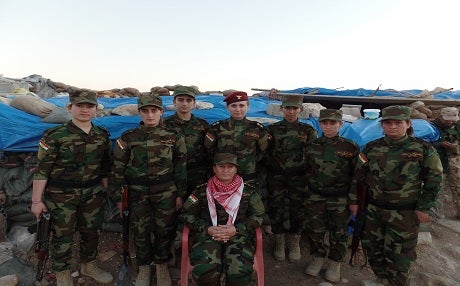
For a female Yezidi Peshmerga platoon, the victory in Shingal was a rebirth for the city ravaged by ISIS.
For an all-female Yezidi platoon of Peshmerga fighters, recapturing Shingal was an emotional and symbolic victory. Many of the 500 women in the brigade had lived in Shingal and witnessed the massacre: family members tortured, murdered or taken hostage.
“This is a historic day for every Kurd and Yezidi,” said Captain Khatun Ali, the brigade’s commander. “We became a model for women everywhere to defend themselves.”
Ali and her fighters came to the frontlines two days before the offensive started. Although they had not received official training and did not see heavy fighting, the women were more than ready to take aim at ISIS with their AK rifles, the commander said.
“It is a holy day for the Yezidis,” Ali said. “It is a rebirth.”
The cost
Positioned on the frontlines of Shingal since the city was captured, Peshmerga Captain Islam Omar, 45, had spent the last year and a half of his life in a sandbag bunker a couple kilometers away from the jihadists.
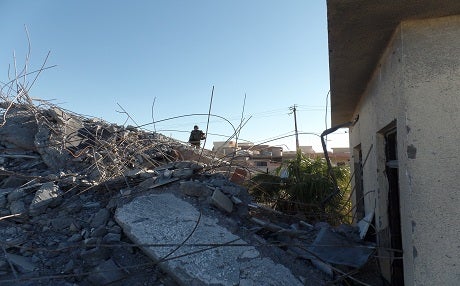
A Peshmerga fighter climbs up rubble that once was a government building in Shingal.
His often sleepless nights were haunted by images of fellow fighters dying next to him in battle. Omar recalled the time when he and his friend were fighting on the mountain. His companion was steadying a PK machine gun while Omar fired down on the city. The next thing Omar remembers is seeing his friend lying in the dirt, dead from an ISIS sniper shot.
“I couldn’t eat for four days,” the captain said, shaking his head and looking down. He started to expound, but then stopped himself and stayed silent.
The leather-skinned captain, clad in a combat vest full of extra ammunition clips, lit a cigarette and removed his helmet. He held it out and rubbed his battle-calloused hands over the top.
“These are from sniper shots he said,” pointing to chips and scratches. “We lost 180 Peshmerga to ISIS snipers in Shingal.”
As victory fire rang out along the frontline, Omar pointed to a large metal projectile plugged into the ground near his bunker. It was a rocket launched by ISIS a week earlier.
“I saw them shoot it and told my guys to take cover,” Omar said. He watched it hurl toward his camp and knew he didn’t have enough time to escape.
The captain pressed himself against the sand bags and heard the projectile land with a thud. And then, nothing.
“Thank God it didn’t explode,” he said.
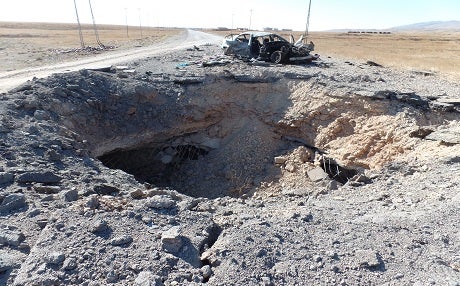
An airstrike gouged a giant hole in the road that served as a vital supply route for ISIS before Kurdish fighters recaptured Shingal.
Omar knows how lucky he was to have survived that incident, and the countless others he endured on one of the most dangerous frontlines with ISIS.
“The Peshmerga believed Shingal was a place to die,” he said. “I had nightmares about bringing men up here.”
Omar, who has been a Peshmerga for 23 years, said he has been unfazed by the host of struggles that have driven many men away from battle: the likely chance of death or serious injury, pleas from family to come home and lack of salary for the service, to name a few.
“My duty is more important than these things,” he said, as victory fire and chants continued. “Now Shingal is liberated, and the whole world came to watch the victory.”
The aftermath
In the ravaged city of Shingal, ISIS left behind traces of its reign of terror. There were mass graves on the outskirts of town, where ISIS dragged the bodies of dead Yezidis. Buried beneath the rubble of hollowed out houses and buildings there were more subtle clues: hidden tunnels laced with landmines, walls spray-painted with Arabic messages like “ISIS is here to stay forever.”

A Peshmerga fighter carefully inspects a building that might have been booby-trapped by ISIS in the city of Shingal.
Wires were splayed from overturned telephone poles blocking the entrance into the complex of government buildings. Most structures there were reduced to piles of cinder block with long pieces of rebar and wires snaking through the rubble.
Explosions rocked the nearly abandoned city every couple of minutes as Kurdish fighters came across explosives and booby traps planted by ISIS. Warplanes roared overhead, traveling east to attack ISIS positions in villages along the Syrian border.
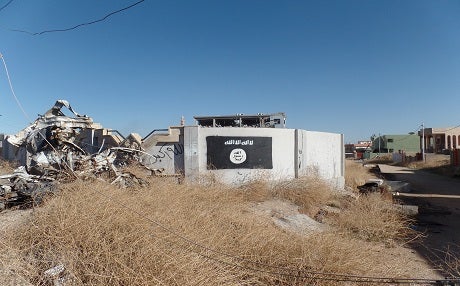
ISIS flags and propaganda were scattered throughout Shingal City.
On the west side of the city, a fire blazed behind a column of storage units that served as a bomb-making facility. Blocks of homemade explosives were stacked against a wall near a large circular saw. The smell of sulfur lingered thick in the air.
Although hundreds of structures were completely destroyed and many were badly damaged, a number of buildings remained intact. Several mosques, for example, stood seemingly undamaged by airstrikes or artillery fire.
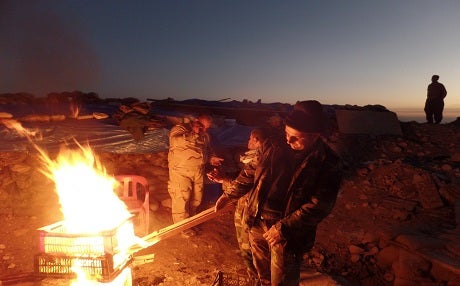
Peshmerga fighters gather around a fire on the frontlines in Shingal the night the city was liberated.
By Sunday, anything salvageable in Shingal was being hauled away by trucks racing down the mountain after news broke that the city was liberated, though certainly not secure. Vehicles loaded with refrigerators, furniture, televisions and anything with potential value left the city and crawled up the winding roads of the mountain.
The sun set on a liberated Shingal City, and it was quiet; no firefights, mortars or airstrikes.
“Long live Peshmerga,” the young fighter yelled, raising his old Kalashnikov rifle toward the sky. In the desolate, crumbling village a few kilometers east of Shingal City, his cheers were answered by fellow fighters standing triumphantly over the bodies of dead extremists.
Back in the city, shots rang out along the frontline. Peshmerga were perched on top of the sandbag fortresses that for months had protected them from constant bombing, mortar shelling and sniper fire by the Islamic State.
But this day—Saturday, November 14—there was no return fire. After more than a year and a half in Islamic State control, the city of Shingal had been liberated.
Following weeks of delay, the offensive led by the Peshmerga, with participation from other Kurdish allies like the Kurdistan Workers’ Party (PKK) and People’s Protection Units (YPG), ended swiftly. A bombardment of US-led coalition airstrikes leading up to the operation helped wipe out most of the ISIS fighters remaining in the city.
The most valuable strategic prize of the operation was the main road running through Shingal. It served as a vital ISIS supply route from its de-facto capital of Raqqa in Syria to its stronghold of Mosul in Iraq.
The effects of retaking the city and cutting the supply line remain to be seen, but the immediate impact of liberation was very much evident.
The victory
In early August last year, ISIS besieged the city of Shingal (Sinjar) and massacred thousands of Kurdish Yezidis. Some survivors fled to the mountains, where they have lived in poor conditions ever since. But thousands more were slaughtered. Women were raped and forced to become sex slaves. Even after Shingal’s liberation, many remain in ISIS captivity.

For a female Yezidi Peshmerga platoon, the victory in Shingal was a rebirth for the city ravaged by ISIS.
For an all-female Yezidi platoon of Peshmerga fighters, recapturing Shingal was an emotional and symbolic victory. Many of the 500 women in the brigade had lived in Shingal and witnessed the massacre: family members tortured, murdered or taken hostage.
“This is a historic day for every Kurd and Yezidi,” said Captain Khatun Ali, the brigade’s commander. “We became a model for women everywhere to defend themselves.”
Ali and her fighters came to the frontlines two days before the offensive started. Although they had not received official training and did not see heavy fighting, the women were more than ready to take aim at ISIS with their AK rifles, the commander said.
“It is a holy day for the Yezidis,” Ali said. “It is a rebirth.”
The cost
Positioned on the frontlines of Shingal since the city was captured, Peshmerga Captain Islam Omar, 45, had spent the last year and a half of his life in a sandbag bunker a couple kilometers away from the jihadists.

A Peshmerga fighter climbs up rubble that once was a government building in Shingal.
His often sleepless nights were haunted by images of fellow fighters dying next to him in battle. Omar recalled the time when he and his friend were fighting on the mountain. His companion was steadying a PK machine gun while Omar fired down on the city. The next thing Omar remembers is seeing his friend lying in the dirt, dead from an ISIS sniper shot.
“I couldn’t eat for four days,” the captain said, shaking his head and looking down. He started to expound, but then stopped himself and stayed silent.
The leather-skinned captain, clad in a combat vest full of extra ammunition clips, lit a cigarette and removed his helmet. He held it out and rubbed his battle-calloused hands over the top.
“These are from sniper shots he said,” pointing to chips and scratches. “We lost 180 Peshmerga to ISIS snipers in Shingal.”
As victory fire rang out along the frontline, Omar pointed to a large metal projectile plugged into the ground near his bunker. It was a rocket launched by ISIS a week earlier.
“I saw them shoot it and told my guys to take cover,” Omar said. He watched it hurl toward his camp and knew he didn’t have enough time to escape.
The captain pressed himself against the sand bags and heard the projectile land with a thud. And then, nothing.
“Thank God it didn’t explode,” he said.

An airstrike gouged a giant hole in the road that served as a vital supply route for ISIS before Kurdish fighters recaptured Shingal.
Omar knows how lucky he was to have survived that incident, and the countless others he endured on one of the most dangerous frontlines with ISIS.
“The Peshmerga believed Shingal was a place to die,” he said. “I had nightmares about bringing men up here.”
Omar, who has been a Peshmerga for 23 years, said he has been unfazed by the host of struggles that have driven many men away from battle: the likely chance of death or serious injury, pleas from family to come home and lack of salary for the service, to name a few.
“My duty is more important than these things,” he said, as victory fire and chants continued. “Now Shingal is liberated, and the whole world came to watch the victory.”
The aftermath
In the ravaged city of Shingal, ISIS left behind traces of its reign of terror. There were mass graves on the outskirts of town, where ISIS dragged the bodies of dead Yezidis. Buried beneath the rubble of hollowed out houses and buildings there were more subtle clues: hidden tunnels laced with landmines, walls spray-painted with Arabic messages like “ISIS is here to stay forever.”

A Peshmerga fighter carefully inspects a building that might have been booby-trapped by ISIS in the city of Shingal.
Wires were splayed from overturned telephone poles blocking the entrance into the complex of government buildings. Most structures there were reduced to piles of cinder block with long pieces of rebar and wires snaking through the rubble.
Explosions rocked the nearly abandoned city every couple of minutes as Kurdish fighters came across explosives and booby traps planted by ISIS. Warplanes roared overhead, traveling east to attack ISIS positions in villages along the Syrian border.

ISIS flags and propaganda were scattered throughout Shingal City.
On the west side of the city, a fire blazed behind a column of storage units that served as a bomb-making facility. Blocks of homemade explosives were stacked against a wall near a large circular saw. The smell of sulfur lingered thick in the air.
Although hundreds of structures were completely destroyed and many were badly damaged, a number of buildings remained intact. Several mosques, for example, stood seemingly undamaged by airstrikes or artillery fire.

Peshmerga fighters gather around a fire on the frontlines in Shingal the night the city was liberated.
By Sunday, anything salvageable in Shingal was being hauled away by trucks racing down the mountain after news broke that the city was liberated, though certainly not secure. Vehicles loaded with refrigerators, furniture, televisions and anything with potential value left the city and crawled up the winding roads of the mountain.
The sun set on a liberated Shingal City, and it was quiet; no firefights, mortars or airstrikes.




Comments
Rudaw moderates all comments submitted on our website. We welcome comments which are relevant to the article and encourage further discussion about the issues that matter to you. We also welcome constructive criticism about Rudaw.
To be approved for publication, however, your comments must meet our community guidelines.
We will not tolerate the following: profanity, threats, personal attacks, vulgarity, abuse (such as sexism, racism, homophobia or xenophobia), or commercial or personal promotion.
Comments that do not meet our guidelines will be rejected. Comments are not edited – they are either approved or rejected.
Post a comment